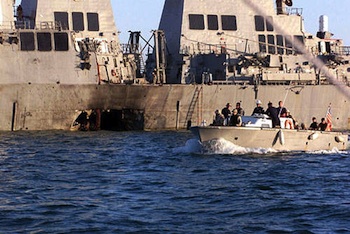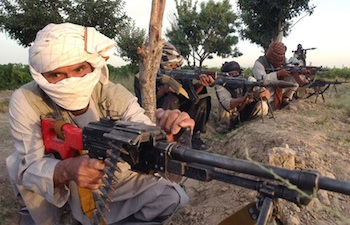Bulletin from Abbottobad
 Roger Fitch Esq •
Roger Fitch Esq •  Saturday, May 21, 2011
Saturday, May 21, 2011 Navy SEALs insensitive about court protocol ... Disney moves quickly ... Debate still raging about Osama and the rule of law ... "High Value Detainees ... Unprivileged Belligerents ... Enemy Combatants" and other odd creatures from the make-it-up-as-you-go-along Law of War ... Roger Fitch from the front line in Washington
"Rejoice not when thine enemy falleth..." Proverbs 24:17
"No, no!" said the Queen. "Sentence first - verdict afterwards." Alice's Adventures in Wonderland
 General Sir James Abbott: went nativeIn May, US special forces dropped into the Punjab and shot dead the wanted fugitive Osama bin Laden, at Abbottabad, a pleasant hill station retreat of the British Raj and home to the Pakistani Sandhurst.
General Sir James Abbott: went nativeIn May, US special forces dropped into the Punjab and shot dead the wanted fugitive Osama bin Laden, at Abbottabad, a pleasant hill station retreat of the British Raj and home to the Pakistani Sandhurst.
The town and district are named for a British player in the Great Game, Major (later General) James Abbott, a poetic dreamer whose portrait suggests he went native.
Curiously, it's the very place where the Bali Bombing "mastermind" was captured, in January.
Cornering bin Laden took 15 years and cost $3 trillion, so it's a shame the Yanks fell at the last hurdle and missed out on the trial of the century. Nevertheless, unseemly rejoicing broke out in the US.
President Obama claimed bin Laden had been "brought to justice," a view disowned by foreign lawyers and Nuremberg prosecutors.
Au contraire. Long-standing criminal indictments against Osama in New York now have to be dismissed.
Apparently, Navy SEALs are less sensitive than US marshals to court protocol and judicial etiquette, and the sentence was carried out before the arraignment and trial.
A delighted Disney quickly trademarked "Seal Team Six" - great for toys and games!
While some lawyers accepted that, in a war paradigm, you could shoot an unarmed enemy, others, including philosophers, archbishops and Geoffrey Robertson QC thought it wrong no attempt was made to take Osama alive.
It's been called targeted assassination, and Murder, Incorporated, and the operation's legality is still being debated - here and here.
The killing of bin Laden brought Bush administration torture enthusiasts out of their caves, including the CIA's former counter-terror chief (and torture evidence destroyer) José Rodriguez, torture lawyer John Yoo and ex-VP Dick Cheney.
In view of bin Laden's fate, other New York defendants such as Ahmed Ghailani, the East African embassy bomber once held at Gitmo and recently convicted in Manhattan, must be grateful they were merely tortured for years while unlawfully withheld from Article III courts, and not shot outright.
Khalid Sheikh Mohamed must be wondering why he's getting a trial at all.
* * *
 The hole in the Cole allegedly made by al NashiriThe military commissions at Guantánamo will be resuming soon, and will be as irregular as the enforcement of Osama bin Laden's arrest warrant.
The hole in the Cole allegedly made by al NashiriThe military commissions at Guantánamo will be resuming soon, and will be as irregular as the enforcement of Osama bin Laden's arrest warrant.
A good example is the newly-announced death penalty "war crime" prosecution of Abd al Rahim al Nashiri, the alleged bomber of the USS Cole in Yemen in 2000.
Nashiri has already been sentenced to death in Yemen, but Americans don't trust other countries to carry out the dirty work.
In September 2006, Nashiri was one of 14 "high value detainees" deposited at Guantánamo to signify really bad people were held at a place set up for prisoners from a real war, Afghanistan.
The theory was that, once associated with war through their presence in a war prisoner camp, the HVDs would ipso facto become belligerents who could stand trial for "crimes" committed during a war.
Like Ahmed Ghailani, Nashiri is charged with events which occurred before 9/11, and before there was a war. As in Ghailani's case, the crime occurred in a place where there was not even an armed conflict.
During the last round of commissions, Nashiri was apparently the only person charged with a valid war crime, perfidy.
But there was a problem. Perfidy may be a war crime, but - oddly enough - only when there's a war going on.
Yet there was no war between the US and Yemen (or al-Qaeda) in 2000, no enemy or theatre of battle in the region. There wasn't the "war" required for "belligerents" and "war crimes".
Help is at hand, however: the legal fiction.
Nothing fascinates first year law students like this device, which Butterworths defines as, "An assumption that purports to or does, conceal, alter, or modify a fact or rule of law".
Legal fictions are still with us. George Bush used them in his Guantánamo orders with their fictional "enemy combatants". Congress stuffed the Military Commissions Acts with imaginary "war crimes".
Obama also relies on false assumptions for his Guantánamo trials.
First, the government now claims that Osama bin Laden's 1996 fatwa calling for jihad against the US was a declaration of war such as nations make. The government said nothing at the time.
Accordingly, we've been at war with Al-Qaeda, everywhere anyone associated with Al-Qaeda can be found, since Bill Clinton was president.
Anyone who can be dressed up as an enemy of the US during that period, who has suitable radical connections (as defined, it seems, by Congress's post-9/11 Authorisation to Use Military Force), who has harmed, tried to harm or even supported harming an American, can be tried for war crimes in a military commission.
The second legal fiction? The Geneva Conventions define offences of belligerents by their acts. By contrast, the US fiction defines crimes by the status of the belligerent, and deems that irregular forces - unprivileged belligerents - have no rights to oppose US troops.
 Taliban army: no legal statusIt's an astonishing notion, specially since it is applied to regular troops of countries whose governments the US claims are irregular, e.g. to the Taliban and Afghanistan.
Taliban army: no legal statusIt's an astonishing notion, specially since it is applied to regular troops of countries whose governments the US claims are irregular, e.g. to the Taliban and Afghanistan.
Hence the Afghan foreign secretary, minister of commerce, ambassador to Pakistan and officers in the Taliban Army all found themselves bailed-up at Guantánamo when the US adopted the fiction that they had no legal status under sundry international treaties.
This American gloss on the law of war makes self-defence by unprivileged belligerents - free of any treachery or unlawful means - an automatic war crime, if injury results to Americans or their property, as Omar Khadr found to his cost (see post of November 18).
At the same time, the US asserts a right of anticipatory, national self-defence - not yet accepted in the law of war - to justify actions it takes around the world in matters involving no imminent danger to the US.
Heads we win, tails they lose.










Reader Comments